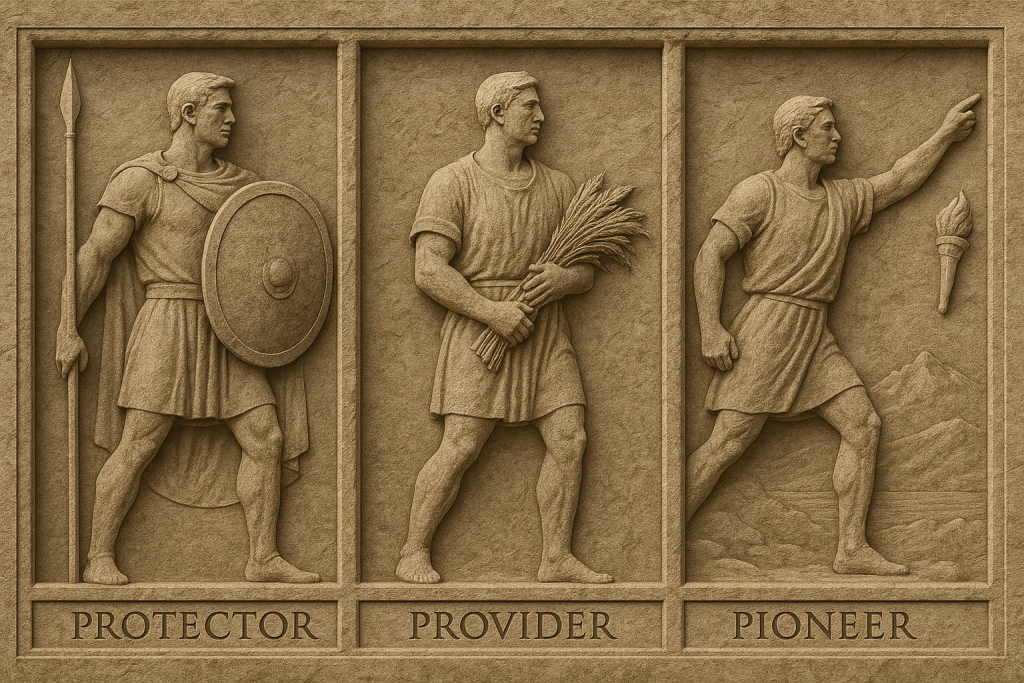
What is a Natural Man?
The Natural Man lives by three timeless roles: Protector, Provider, Pioneer. He does not wait for permission, nor bend to shifting cultural trends. His purpose is action—defending, building, and exploring. In return, he seeks appreciation and legacy. This philosophy restores men to the roles they were born to embody.
The Three Elements of a Natural Man
The Protector
The Provider
The Pioneer
To leave a lasting mark, a man must be all three:
Protector, Provider, and Pioneer.
Latest Articles
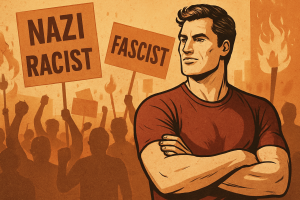
When the Mob Decides You’re a Villain
When society turns disagreement into a death sentence, modern men scramble to hide, apologize, and conform, but it never saves them. The Natural Man stands firm because his roles—Protector, Provider, Pioneer—don’t change with the mob’s mood. He doesn’t seek approval to live out his purpose, which is why he remains steady while others collapse.
Free Membership Membership Required
You must be a Free Membership member to access this content.
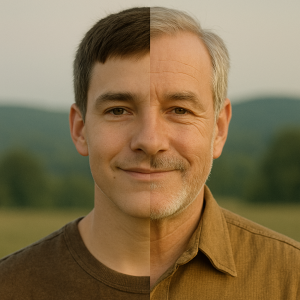
The Rewards of Being a Natural Man
Most men live their lives straining after rewards that are not really theirs to control. Recognition, reproduction, status, applause—these are the external carrots dangled in
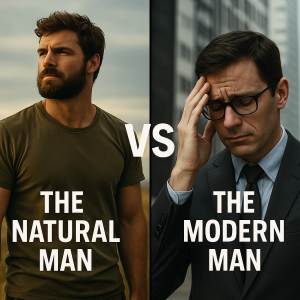
The Natural Man Versus the Modern Man
The Natural Man: He does not wait for permission, nor does he outsource his identity to a committee. He is defined by what he does, not by what others permit him to do, and his doing is anchored in three ancient roles: the Protector, the Provider, and the Pioneer. These roles are not costumes he puts on to win applause; they are disciplines by which he shapes himself and serves others. They are not theories. They are actions.

Relationships That Multiply: When One Times One Equals More Than Two
A transactional relationship is exhausting. Each day becomes a silent audit. Did I do enough to deserve affection? Did she do enough to deserve my sacrifice? Did I provide enough money? Did she give enough recognition? The ledger never balances, because human effort is too messy to be perfectly measured.
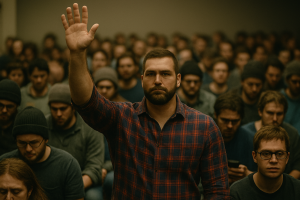
The Shame of Wanting to Be Respected
It didn’t used to be shameful to want respect. It was expected. Taught. Modeled. Earning a reputation was part of becoming a man. You worked for it. You protected it. You lived in such a way that your name meant something when people said it.
But somewhere along the way, men were told that if they desired respect, they must be chasing power. That to want recognition meant you were compensating. That a man asking to be valued must secretly be weak.

The Ache to Be Useful: Not Just Employed, But Needed
A man can have a job, even a good one, and still feel hollow inside. The paycheck may cover the bills, the hours may be
The Natural Man versus the Modern Man
Walk down a busy street and you can spot the modern man without checking his name tag. His posture is slightly hunched, not from lack of strength but from the invisible weight of expectation. He is fluent in the language of performance—metrics, optics, impressions—yet strangely mute when it comes to conviction. He works hard, but the work seems to own him. He speaks often, but says little that is truly his. The modern man is the broken, frustrated, never-fulfilled version of manhood: a slave to society’s demands, trained by guilt and shame, and motivated by an insecure thirst for approval.
The modern man’s story begins with a bait-and-switch. He is promised belonging if he conforms, respect if he complies, and meaning if he maintains the appearance of success. What he receives instead is chronic self-doubt. He learns to calibrate his value against the reactions of others—bosses, peers, the digital crowd—so his courage dries up and his choices grow timid. Approval functions like a drug: the first dose thrills, the second steadies, and the rest never quite deliver. The finish line moves with every new trend, policy, and opinion poll, until he is sprinting to stay in place.
Guilt and shame are the reins by which society steers him. Guilt whispers that he hasn’t done enough; shame hisses that who he is isn’t good enough. If the modern man shows strength, shame calls it threatening. If he refuses to comply, guilt calls it selfish. If he succeeds, envy calls it unfair. Gradually, he edits himself—smaller goals, safer words, compromised standards—until the man in the mirror is a stranger wearing his face. In that condition, even pleasure becomes a decoy. Distractions numb, but they cannot satisfy; entertainment fills hours, not souls.
Now set beside him the natural man. He does not wait for permission, nor does he outsource his identity to a committee. He is defined by what he does, not by what others permit him to do, and his doing is anchored in three ancient roles: the Protector, the Provider, and the Pioneer. These roles are not costumes he puts on to win applause; they are disciplines by which he shapes himself and serves others. They are not theories. They are actions.

The Protector is not merely a man who can fight; he is a man who will stand. His first question, when something threatens those under his care, is never “What will people think of me?” but “What must be done to keep them safe?” Protection begins with presence—showing up, watching the horizon, quietly taking responsibility for danger others do not want to acknowledge. It continues with restraint—the wisdom to know when to de-escalate, when to endure, and when to intervene. It culminates in courage—the decision to step forward when stepping back would be easier. The Protector’s strength is not for self-glory; it is pledged strength, aimed outward.
The Provider treats work as contribution, not penance. He does not sell his hours like a man pawning heirlooms; he invests his energy so that those he loves can rely on him. The Provider is allergic to the emptiness of mere performance; he seeks usefulness. He bends his talents toward building something that lasts—skill, savings, systems, shelter, stability. Because he understands that money is a means and not a master, he can make hard choices about career and commitments without forfeiting his soul. He does not posture as indispensable; he becomes indispensable through competence, consistency, and care. Where the modern man drifts into burnout bargaining—“If I survive this quarter, then I’ll feel better”—the Provider asks a sharper question: “What am I actually providing, and to whom?” That question keeps him aligned.
The Pioneer carries the old human hunger to discover, improve, and advance. He does not idolize comfort; he respects it as a waystation, not a destination. The Pioneer volunteers for uncertainty: new skills, new ventures, new responsibilities that no one has charted yet. He treats failure as data and fear as a navigation beacon—evidence of a frontier worth crossing. The modern man hesitates at the borderlands because failure threatens his image. The Pioneer moves anyway because progress requires risk. In his wake, possibility becomes path.
These roles are not mutually exclusive. They reinforce each other. The Protector’s vigilance guards the Provider’s hard-won gains. The Provider’s stability funds the Pioneer’s push into the unknown. The Pioneer’s discoveries expand what the Protector can defend and what the Provider can distribute. That interlock is why a natural man feels incomplete when any one role is starved. He doesn’t need to be perfect in all three at once; he needs to be active in all three across time. He needs a life that lets him protect, provide, and pioneer in season.
What, then, does the natural man ask in return? He does not demand worship. He does not negotiate for applause. He desires two things that are proportionate to his responsibility: appreciation and legacy. Appreciation is simple acknowledgment, not theatrical gratitude. It says, “I see what you carry, what you fix, what you risk.” Appreciation matters because men are not machines; recognition fuels endurance, clarifies purpose, and tightens the bond between duty and affection. It is not flattery—it is truth spoken aloud.
Legacy is the long echo of a man’s life. It is not merely biology; it is the lasting imprint of character, craft, and contribution. Legacy can be children who absorb his steadiness and pass it on. It can also be apprentices he has trained, institutions he has strengthened, communities he has made safer, and ideas he has set in motion that keep working when he is done working. Legacy is the antidote to the modern man’s treadmill, because it re-anchors daily effort to consequences that outlive the news cycle. The natural man builds with the distant horizon in mind.
This difference in reward reshapes the way a man meets the day. If approval is the prize, he will contort. If appreciation and legacy are the rewards, he will commit. Approval asks, “Do they like me for what I appear to be?” Appreciation and legacy ask, “Did I do what I said I would? Did it matter?” Approval demands immediate feedback and constantly changes the rules. Appreciation and legacy ask for patience and keep the rules the same: be reliable, be brave, be useful, build something that lasts.
Modern culture does not quite know what to do with such a man. It will try to retrain him through the levers it understands: guilt and shame. It will tell the Protector that strength is dangerous, the Provider that leadership is oppressive, and the Pioneer that ambition is suspect. The goal is not to refine him, but to domesticate him. Yet the natural man cannot be tamed by accusation because he is governed by responsibility. He is not loud, but he is stubborn. He listens, but he does not cave. He is not reactive; he is resolute.
This is not a romantic varnish. The natural man still bleeds. He faces exhaustion, confusion, and the ache of being misunderstood. He will sometimes misjudge, overreach, or stall out. The difference is that he knows what to return to when he loses his way. He does not chase the next approval spike; he re-commits to protecting, providing, and pioneering, one concrete act at a time. He resets by asking, “Who needs me safe? Who needs me steady? Where is the frontier I am called to push?” Then he gets back to work.
The modern man lives compressed by other people’s narratives, checking boxes that never add up to meaning. The natural man lives expanded by duty, writing a story that makes sense from the inside out. One is animated by insecurity and thus remains fragile. The other is animated by purpose and thus becomes strong. One expends himself for appearances and ends empty. The other spends himself for people and ends full. One drifts toward resentment because nothing is ever enough. The other moves toward gratitude because endurance and impact produce quiet satisfaction.
Every man must decide who is holding the pen. If society writes the script, he will play the role of the modern man—exhausted, compliant, and perpetually hungry for a nod. If he writes his life through the disciplines of the Protector, the Provider, and the Pioneer, he will become a natural man—anchored by responsibility, fueled by appreciation, and aimed at legacy. That road is narrow, but it is real. And it leads somewhere worth arriving.
We've got your six
Subscribe now to stay ahead of the action
© 2026 All Rights Reserved.
